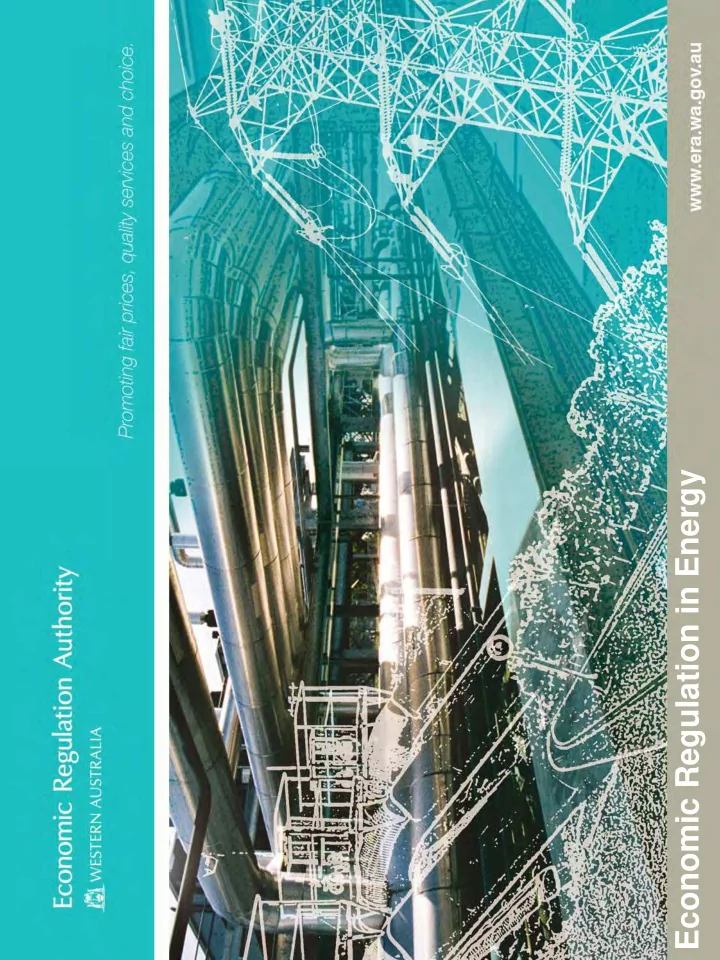

Economic Regulation in Energy
Economic Regulation in Energy K Peter Kolf General Manager Economic Regulation Authority 28 March 2007 Science & Engineering Murdoch University
Overview • The Economic Regulation Authority • Economic Regulation • Issues
The Economic Regulation Authority Functions • Administers Access to Infrastructure • Licenses Service Providers • Monitors & Regulates Markets • Inquiries (Referred by Government) Features • Independent of Government, Industry & Consumer Groups
Economic Regulation Authority Governing Body General Manager Corporate Executive Director Executive Director Manager Director Director Gas and Rail References Finance & Competition Access Licensing, and Research Administration Markets & Monitoring & Electricity Customer Protection
Infrastructure Gas Pipeline
Infrastructure Electricity
Infrastructure Rail
Services Water
Matters to which the Authority must have regard • Promote the public interest • Consider the long-term interests of consumers • Encourage investment • Consider the interests of investors & service providers • Promote competition & fair market conduct • Prevent abuse of monopoly power • Practice transparent decision making Section 26 Economic Regulation Authority Act 2003
Objective Function Maximise: • Long term interests of consumers Subject to: • Interests of investors & service providers • Encourage investment • Environmental protection
Environment Max W Optimum Investment
Economic Efficiency Singularity • Technical efficiency • Allocative efficiency • Dynamic efficiency
Objective Function Maximise: • Long term interests of consumers Subject to: • Interests of investors & service providers • Encourage investment • Environmental protection • Re-elect Minister
Objective Function Maximise: • Re-elect Minister Subject to: • Interests of investors & service providers • Encourage investment • Environmental protection • Long term interests of consumers
Investment Interests of Investors Election of Long Term Interests Minister of Consumers Environment
Energy Transmitted TJ/d Energy Transmission Company Optimum Max W Max π Excess π = 0 Energy Consumed TJ
Profit 200 100 0 100-200 -100 0-100 -100-0 -200 -200--100 -300--200 -300 -400--300 -500--400 -400 -600--500 -700--600 -500 -800--700 -600 S31 S26 -700 S21 S16 -800 S11 1 3 5 7 9 S6 11 13 15 17 19 21 23 S1 25 27 29 31 33
Consumer Surplus 200 150 100 150-200 50 100-150 50-100 0-50 0 -50-0 -100--50 -50 -150--100 -200--150 -100 31 26 -150 21 16 -200 11 1 3 5 7 9 6 11 13 15 17 19 21 23 1 25 27 29 31 33
No Proof of Hypothesis “The great difficulty in the social sciences (if we may presume to call them so) of applying scientific method, is that we have not yet established an agreed standard for the disproof of an hypothesis. Without the possibility of controlled experiment, we have to rely on the interpretation of evidence, and interpretation involves judgement; we can never get a knock-down answer. But because the subject is necessarily soaked in moral feelings, judgement is coloured by prejudice.” (Joan Robinson, Economic Philosophy, 1962, p26)
Prejudice “Anyone who says to you: ‘Believe me, I have no prejudices,’ is either succeeding in deceiving himself or trying to deceive you.” (Joan Robinson, Economic Philosophy, 1962, p26)
First Principles of Regulation • There is a demonstrated need for regulation • It actually works • It’s least restrictive on consumer sovereignty • It’s benefits outweigh the costs • It’s user friendly • It’s consistent with the nature of things
Types of Regulation • Public sector ownership & control • Price control of private sector • Market based regulation – Open access – Structural separation – Markets in contestable elements – Price or revenue cap for monopoly elements • Monitoring / transparency
Supply of Goods & Services Private Goods Common Property Bread, Butter etc Fisheries, Water resources etc Mixed Goods Public Goods Pipelines, Wires etc Free to air, Defence etc
Monopoly Factors: • Economies of scale • Economies of scope • Other barriers to entry – new infrastructure
Externalities • Environmental • Social • Other
Economic Regulation Flexible Inflexible Regulation Prescription Legislated Dictated Mayhem Mayhem (Legal utopia)
Economic Regulation
Conclusions • Economic regulation continues to be contentious, but settling • Regulation is second-best, but in some circumstances necessary • Benefits of economic regulation not always obvious • Issues complex, counter intuitive and easily misunderstood • Litigation costly and time consuming • One regulatory model does not fit all circumstances
Economic Regulation in Energy
Recommend
More recommend